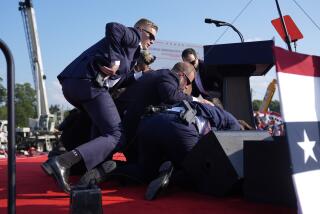Bush Wants More Air Marshals
- Share via
WASHINGTON — President Bush, seeking to reassure worried travelers, will call today for more government involvement in airport security screening, installation of assault-resistant cockpit doors and a dramatic increase in the federal air marshal program, congressional and aviation sources said Wednesday.
The proposals amount to a broad expansion of the federal role in airport security but stop short of advocating a direct federal takeover of passenger screening, which is now in the hands of private companies hired by the airlines.
Instead, Bush favors much higher standards, better pay and closer federal oversight of screeners, as well as the deployment of local law enforcement officers to airport security checkpoints, sources said. Administration officials were also considering a federally chartered nonprofit corporation to administer airport security.
As for arming pilots, which was proposed by the Air Line Pilots Assn., Bush indicated to reporters Wednesday that he is not enthusiastic about the idea. Congressional sources said it will not be part of his plan.
The president will travel to Chicago’s O’Hare International Airport today to make his announcement, along with Transportation Secretary Norman Y. Mineta and a bipartisan congressional delegation.
“One of my concerns is that this terrible incident has . . . convinced many Americans to stay at home,” Bush said Wednesday of the Sept. 11 attacks. “And one of the keys to economic recovery is going to be the vitality” of the airlines.
“We’ll announce some confidence-boosting measures, some concrete proposals, and I believe we’ll be able to work with Congress to get them done in an expeditious way,” Bush added. His comments in a brief session with reporters came at a White House meeting with Muslim and Arab American leaders.
Officials said details of the plan were still in flux Wednesday evening.
Among the measures under consideration was a proposal for video cameras to monitor airliner cockpits and cabins. “We should be using the same kind of video cameras that are used in ATM machines,” said Sen. Richard Durbin (D-Ill.), who will accompany the president today.
Rep. John Mica (R-Fla.), chairman of the House Transportation aviation subcommittee, said Bush plans to announce a “dramatic expansion” of the sky marshal program.
The size of the federal air marshal program is kept a secret. But before the Sept. 11 attacks, several members of Congress had indicated that there were only a few dozen marshals in the program. Since the hijackings, their ranks have been bolstered by agents from other federal law enforcement agencies, authorities said. And the Federal Aviation Administration has received hundreds of inquiries from citizens who are interested in becoming marshals.
Another congressional official said the goal is to have an undercover marshal on most flights. There are an estimated 25,000 daily airline takeoffs, but many involve relatively short hops between cities.
Other likely measures include wider use of a computer program that can identify passengers who pose a potential security threat, and an overhaul of antihijacking training for pilots and flight attendants, who now rely on manuals based on the rash of hijackings to Cuba in the 1960s and ‘70s.
Congressional sources said Bush will also propose more federal funding to help airports pay for improved security.
Although all airports except Washington’s Reagan National have reopened, travelers have not flocked back to the skies. In an interview Friday, Mineta estimated that airlines are flying about 80% of their previous schedules with passenger loads less than half of what they were before Sept. 11. Congress has approved a bailout package for the industry, but only a return of consumer confidence can restore it to health.
Meanwhile, businesses that depend on airlines to transport their customers--such as theme parks, hotels and car rental companies--are also taking an economic hit.
Congress is not likely to rubber-stamp the president’s package, particularly if pilots, flight attendants and other aviation interests raise doubts that it will do the job. Lawmakers consider themselves experts on air travel, since they must constantly shuttle back and forth to their districts. They can easily imagine themselves in the place of passengers aboard one of the four hijacked jets.
“The biggest frequent flier club in America is made up of members of Congress,” Durbin said. “We spend many of our waking moments on airliners and in airports. I’ve gone through those checkpoints, and I’ve seen the worst.”
The critical test of Bush’s plan, lawmakers said, is whether it significantly improves airport security through passenger and employee screening. The FAA has already ordered more thorough background checks for employees, and new FAA standards for passenger screening were due out before the hijackings. But lawmakers say more is needed.
“I want real supervision and a new atmosphere at these security checkpoints,” Durbin said. Although he would prefer that federal employees take over the job, Durbin said he is keeping an open mind about what Bush may propose.
Under one scenario still being considered by the administration, a nonprofit corporation would set standards, establish training protocols and provide close supervision of the security checkpoint workers.
“I want results; I don’t care if they are federal employees, or they work for the private sector,” Durbin said.
Senate staffers say there is strong bipartisan sentiment in that chamber for having federal employees take over airport security. But in the House, conservatives are reluctant to expand the size of the federal work force by thousands.
Mica, the House aviation chairman, said he expects a compromise to be reached.
“The standards definitely will be federal” for training, background checks and supervision, he said.
More to Read
Sign up for Essential California
The most important California stories and recommendations in your inbox every morning.
You may occasionally receive promotional content from the Los Angeles Times.











